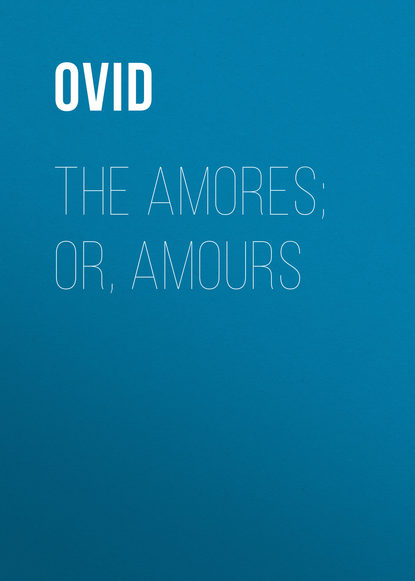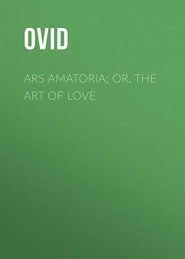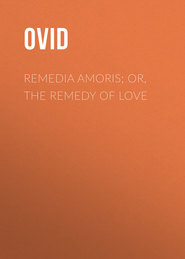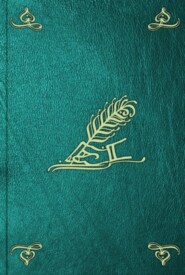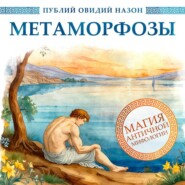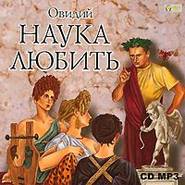По всем вопросам обращайтесь на: info@litportal.ru
(©) 2003-2024.
✖
The Amores; or, Amours
Настройки чтения
Размер шрифта
Высота строк
Поля
549 (return (#x4_x_4_i72))
[ Bears away the palm.—Ver. 82. The favourite charioteer is now victorious, and the Poet hopes that he himself may gain the palm in like manner. The victor descended from his car at the end of the race, and ascended the 'spina,' where he received his reward, which was generally a considerable sum of money. For an account of the 'spina,' see the Metamorphoses, Book x. l. 106, and the Note to the passage.]
550 (return (#x5_x_5_i2))
[ Her beauty remains.—Ver. 2. She has not been punished with ugliness, as a judgment for her treachery.]
551 (return (#x5_x_5_i2))
[ Proved false to me.—Ver. 10. Tibullus has a similar passage, 'Et si perque suos fallax juravit ocellos 'and if with her eyes the deceitful damsel is forsworn.']
552 (return (#x5_x_5_i3))
[ Its divine sway.—Ver. 12. 'Numen' here means a power equal to that of the Divinities, and which puts it on a level with them.]
553 (return (#x5_x_5_i3))
[ Mine felt pain.—Ver. 14. When the damsel swore by them, his eyes smarted, as though conscious of her perjury.]
554 (return (#x5_x_5_i3))
[ Forsooth to you.—Ver. 17. He says that surely it was enough for the Gods to punish Andromeda, the daughter of Cepheus, for the sins of her mother, without making him to suffer misery for the perjury of his mistress. Cassiope, the mother of Andromeda, having dared to compare her own beauty with that of the Nereids, her daughter was, by the command of Jupiter, exposed to a sea-monster, which was afterwards slain by Perseus. See the Metamorphoses, Book iv. 1. 670.]
555 (return (#x5_x_5_i4))
[ Hurls at the groves.—Ver. 35. A place which had been struck by lightning was called 'bidental,' and was held sacred ever afterwards. The same veneration was also paid to a place where any person who had been killed by lightning was buried. Priests collected the earth that had been torn up by lightning, and everything that had been scorched, and buried it in the ground with lamentations. The spot was then consecrated by sacrificing a two-year-old sheep, which being called 'bidens,' gave its name to the place. An altar was also erected there, and it was not allowable thenceforth to tread on the spot, or to touch it, or even look at it. When the altar had fallen to decay, it might be renovated, but to remove its boundaries was deemed sacrilege. Madness was supposed to ensue on committing such an offence; and Seneca mentions a belief, that wine which had been struck by lightning, would produce death or madness in those who drank it.]
556 (return (#x5_x_5_i4))
[ Unfortunate Semele.—Ver. 37. See the fate of Semele, related in the Third Book of the Metamorphoses.]
557 (return (#x5_x_5_i5))
[ Have some regard.—Ver. 49. Or, in other words. 'Don't sweat any more by my eyes.']
558 (return (#x5_x_5_i9))
[ Because she cannot, stilt sews.—Ver. 4. It is not a little singular that a heathen poet should enunciate the moral doctrine of the New Testament, that it is the thought, and not the action, that of necessity constitutes the sin.]
559 (return (#x5_x_5_i10))
[ A hundred in his neck.—Ver. 18. In the First Book of the Metamorphoses, he assigns to Argus only one hundred eyes; here, however, he uses a poet's license, prohably for the sake of filling up the line.]
560 (return (#x5_x_5_i10))
[ Its stone and its iron.—Ver. 21. From Pausanias and Lucian we learn that the chamber of Danaë was under ground, and was lined with copper and iron.]
561 (return (#x5_x_5_i12))
[ Nor yet is it legal.—Ver. 33. He tells him that he ought not to inflict loss of liberty on a free-born woman, a punishment that was only suited to a slave.]
562 (return (#x5_x_5_i12))
[ Those two qualities.—Ver. 42. He says, the wish being probably the father to the thought, that beauty and chastity cannot possibly exist together.]
563 (return (#x5_x_5_i13))
[ Many a thing at home.—Ver. 48. He tells him that he will grow quite rich with the presents which his wife will then receive from her admirers.]
564 (return (#x5_x_5_i18))
[ Its bubbling foam..—Ver. 13. He alludes to the noise which the milk makes at the moment when it touches that in the pail.]
565 (return (#x5_x_5_i18))
[ Ewe when milked.—Ver. 14. Probably the milk of ewes was used for making cheese, as is sometimes the case in this country.]
566 (return (#x5_x_5_i19))
[ Hag of a procuress.—Ver. 40. We have been already introduced to one amiable specimen of this class in the Eighth Elegy of the First Book.]
567 (return (#x5_x_5_i24))
[ River that hast.—Ver. 1. Ciofanus has this interesting Note:—'This river is that which flows near the walls of Sulmo, and, which, at the present day we call 'Vella.' In the early spring, when the snows melt, and sometimes, at the beginning of autumn, it swells to a wonderful degree with the rains, so that it becomes quite impassable. Ovid lived not far from the Fountain of Love, at the foot of the Moronian hill, and had a house there, of which considerable vestiges still remain, and are called 'la botteghe d'Ovidio.' Wishing to go thence to the town of Sulmo, where his mistress was living, this river was an obstruction to his passage.']
568 (return (#x5_x_5_i24))
[ A hollow boat.—Ver. 4. 'Cymba' was a name given to small boats used on rivers or lakes. He here alludes to a ferry-boat, which was not rowed over; but a chain or rope extending from one side of the stream to the other, the boatman passed across by running his hands along the rope.]
569 (return (#x5_x_5_i24))
[ The opposite mountain.—Ver. 7. The mountain of Soracte was near the Flaminian way, in the territory of the Falisci, and may possibly be the one here alluded to. Ciofanus says that its name is now 'Majella,-and that it is equal in height to the loftiest mountains of Italy, and capped with eternal snow. *All one with the day.—Ver. 10. He means to say that he has risen early in the morning for the purpose of proceeding on his journey.]
570 (return (#x5_x_5_i26))
[ The son of Danaë.—Ver. 13. Mercury was said to have lent to Perseus his winged shoes, 'talaria,' when he slew Medusa with her viperous locks.]
571 (return (#x5_x_5_i26))
[ Wish for the chariot.—Ver. 15. Ceres was said to have sent Trip-tolemus in her chariot, drawn by winged dragons, to introduce agriculture among mankind. See the Fourth Book of the Fasti, 1. 558.]
572 (return (#x5_x_5_i27))
[ Inachus.—Ver. 25. Inachus was a river of Argolis, in Peloponnesus.]
573 (return (#x5_x_5_i27))
[ Love for Melie.—Ver. 25. Melie was a Nymph beloved by Neptune, to whom she bore Amycus, king of Bebrycia, or Bithynia, in Asia Minor, whence her present appellation.]
[ Bears away the palm.—Ver. 82. The favourite charioteer is now victorious, and the Poet hopes that he himself may gain the palm in like manner. The victor descended from his car at the end of the race, and ascended the 'spina,' where he received his reward, which was generally a considerable sum of money. For an account of the 'spina,' see the Metamorphoses, Book x. l. 106, and the Note to the passage.]
550 (return (#x5_x_5_i2))
[ Her beauty remains.—Ver. 2. She has not been punished with ugliness, as a judgment for her treachery.]
551 (return (#x5_x_5_i2))
[ Proved false to me.—Ver. 10. Tibullus has a similar passage, 'Et si perque suos fallax juravit ocellos 'and if with her eyes the deceitful damsel is forsworn.']
552 (return (#x5_x_5_i3))
[ Its divine sway.—Ver. 12. 'Numen' here means a power equal to that of the Divinities, and which puts it on a level with them.]
553 (return (#x5_x_5_i3))
[ Mine felt pain.—Ver. 14. When the damsel swore by them, his eyes smarted, as though conscious of her perjury.]
554 (return (#x5_x_5_i3))
[ Forsooth to you.—Ver. 17. He says that surely it was enough for the Gods to punish Andromeda, the daughter of Cepheus, for the sins of her mother, without making him to suffer misery for the perjury of his mistress. Cassiope, the mother of Andromeda, having dared to compare her own beauty with that of the Nereids, her daughter was, by the command of Jupiter, exposed to a sea-monster, which was afterwards slain by Perseus. See the Metamorphoses, Book iv. 1. 670.]
555 (return (#x5_x_5_i4))
[ Hurls at the groves.—Ver. 35. A place which had been struck by lightning was called 'bidental,' and was held sacred ever afterwards. The same veneration was also paid to a place where any person who had been killed by lightning was buried. Priests collected the earth that had been torn up by lightning, and everything that had been scorched, and buried it in the ground with lamentations. The spot was then consecrated by sacrificing a two-year-old sheep, which being called 'bidens,' gave its name to the place. An altar was also erected there, and it was not allowable thenceforth to tread on the spot, or to touch it, or even look at it. When the altar had fallen to decay, it might be renovated, but to remove its boundaries was deemed sacrilege. Madness was supposed to ensue on committing such an offence; and Seneca mentions a belief, that wine which had been struck by lightning, would produce death or madness in those who drank it.]
556 (return (#x5_x_5_i4))
[ Unfortunate Semele.—Ver. 37. See the fate of Semele, related in the Third Book of the Metamorphoses.]
557 (return (#x5_x_5_i5))
[ Have some regard.—Ver. 49. Or, in other words. 'Don't sweat any more by my eyes.']
558 (return (#x5_x_5_i9))
[ Because she cannot, stilt sews.—Ver. 4. It is not a little singular that a heathen poet should enunciate the moral doctrine of the New Testament, that it is the thought, and not the action, that of necessity constitutes the sin.]
559 (return (#x5_x_5_i10))
[ A hundred in his neck.—Ver. 18. In the First Book of the Metamorphoses, he assigns to Argus only one hundred eyes; here, however, he uses a poet's license, prohably for the sake of filling up the line.]
560 (return (#x5_x_5_i10))
[ Its stone and its iron.—Ver. 21. From Pausanias and Lucian we learn that the chamber of Danaë was under ground, and was lined with copper and iron.]
561 (return (#x5_x_5_i12))
[ Nor yet is it legal.—Ver. 33. He tells him that he ought not to inflict loss of liberty on a free-born woman, a punishment that was only suited to a slave.]
562 (return (#x5_x_5_i12))
[ Those two qualities.—Ver. 42. He says, the wish being probably the father to the thought, that beauty and chastity cannot possibly exist together.]
563 (return (#x5_x_5_i13))
[ Many a thing at home.—Ver. 48. He tells him that he will grow quite rich with the presents which his wife will then receive from her admirers.]
564 (return (#x5_x_5_i18))
[ Its bubbling foam..—Ver. 13. He alludes to the noise which the milk makes at the moment when it touches that in the pail.]
565 (return (#x5_x_5_i18))
[ Ewe when milked.—Ver. 14. Probably the milk of ewes was used for making cheese, as is sometimes the case in this country.]
566 (return (#x5_x_5_i19))
[ Hag of a procuress.—Ver. 40. We have been already introduced to one amiable specimen of this class in the Eighth Elegy of the First Book.]
567 (return (#x5_x_5_i24))
[ River that hast.—Ver. 1. Ciofanus has this interesting Note:—'This river is that which flows near the walls of Sulmo, and, which, at the present day we call 'Vella.' In the early spring, when the snows melt, and sometimes, at the beginning of autumn, it swells to a wonderful degree with the rains, so that it becomes quite impassable. Ovid lived not far from the Fountain of Love, at the foot of the Moronian hill, and had a house there, of which considerable vestiges still remain, and are called 'la botteghe d'Ovidio.' Wishing to go thence to the town of Sulmo, where his mistress was living, this river was an obstruction to his passage.']
568 (return (#x5_x_5_i24))
[ A hollow boat.—Ver. 4. 'Cymba' was a name given to small boats used on rivers or lakes. He here alludes to a ferry-boat, which was not rowed over; but a chain or rope extending from one side of the stream to the other, the boatman passed across by running his hands along the rope.]
569 (return (#x5_x_5_i24))
[ The opposite mountain.—Ver. 7. The mountain of Soracte was near the Flaminian way, in the territory of the Falisci, and may possibly be the one here alluded to. Ciofanus says that its name is now 'Majella,-and that it is equal in height to the loftiest mountains of Italy, and capped with eternal snow. *All one with the day.—Ver. 10. He means to say that he has risen early in the morning for the purpose of proceeding on his journey.]
570 (return (#x5_x_5_i26))
[ The son of Danaë.—Ver. 13. Mercury was said to have lent to Perseus his winged shoes, 'talaria,' when he slew Medusa with her viperous locks.]
571 (return (#x5_x_5_i26))
[ Wish for the chariot.—Ver. 15. Ceres was said to have sent Trip-tolemus in her chariot, drawn by winged dragons, to introduce agriculture among mankind. See the Fourth Book of the Fasti, 1. 558.]
572 (return (#x5_x_5_i27))
[ Inachus.—Ver. 25. Inachus was a river of Argolis, in Peloponnesus.]
573 (return (#x5_x_5_i27))
[ Love for Melie.—Ver. 25. Melie was a Nymph beloved by Neptune, to whom she bore Amycus, king of Bebrycia, or Bithynia, in Asia Minor, whence her present appellation.]





